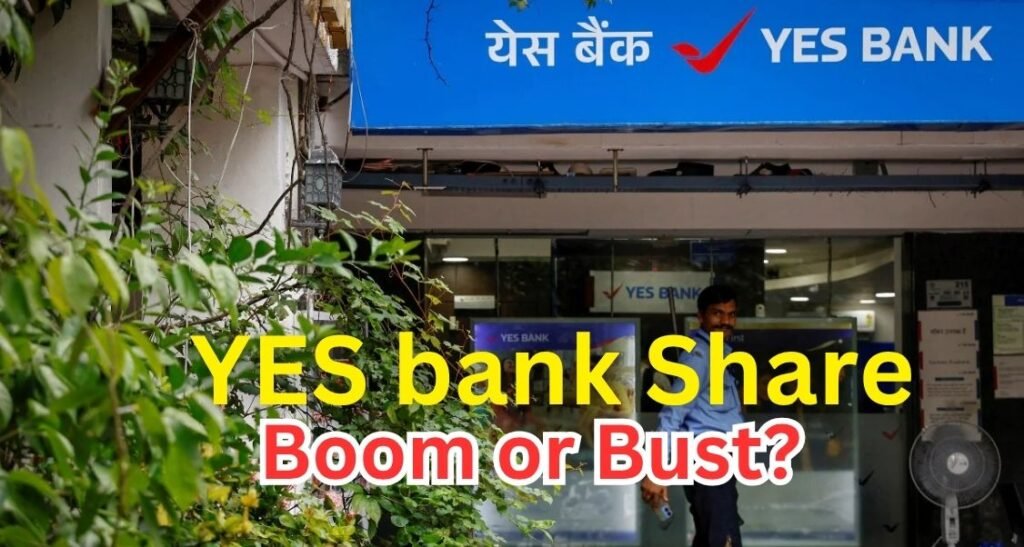Introduction to Yes Bank Share
Yes Bank is one of the nation’s leading private-sector financial institutions, providing a diverse variety of banking services. The financial institution’s shares are traded frequently on the Bombay Stock Exchange (BSE) on the National Stock Market (NSE). Over the years, Yes Bank shares have witnessed significant volatility due to financial crises, management changes, and market fluctuations.
Investors closely monitor Yes Bank share price movements due to its historical highs and dramatic falls. The stock gained attention during its peak in 2018 but faced a major downfall in 2020 due to liquidity issues. Since then, the bank has undergone restructuring, attracting both retail and institutional investors.
Key factors influencing Yes Bank stock include financial performance, RBI regulations, and macroeconomic conditions. The bank’s ability to recover from past setbacks and sustain growth plays a crucial role in investor confidence. Analysts frequently compared Yes Bank to competitors such as HDFC Bank, ICICI Bank, & Axis Bank to analyze its position in the market.
For potential investors, understanding Yes Bank share history, future prospects, and risk factors is essential. This article provides an in-depth analysis of Yes Bank shares, covering past trends, current performance, and expert predictions.

Historical Performance of Yes Bank Share
Yes Bank was once a top-performing stock in the Indian banking sector, reaching an all-time high of ₹404 per share in August 2018. However, the discovery of bad loans and corporate governance issues led to a sharp decline. By March 2020, the stock had dropped to ₹5.55 per share following RBI involvement and a recovery plan.
The Yes Bank crisis was triggered by excessive exposure to troubled companies like DHFL, Anil Ambani Group, and Essel Group. The RBI stepped in, putting an end to the ban and proposing a bailout package involving SBI and other private investors. This restructuring helped stabilize the bank but left shareholders with significant losses.
Post-restructuring, Yes Bank share price has shown gradual recovery, trading between ₹15 to ₹25 in recent years. The bank has focused on improving asset quality, reducing NPAs (non-performing assets), and strengthening its balance sheet. Long-term investors remain cautious, given the bank’s turbulent past.
Historical charts indicate that Yes Bank stock is highly sensitive to news, regulatory actions, and quarterly results. Investors should study past trends before making decisions. Despite its challenges, some traders see potential in Yes Bank as a high-risk, high-reward investment.
Read More: Pakistan Stock Market Update
Current Market Trends of Yes Bank Share
As of 2024, Yes Bank share price has been fluctuating based on quarterly earnings, economic conditions, and banking sector trends. The stock has shown resilience, but volatility remains a concern. The bank’s focus on digital banking and retail loans has helped regain some investor trust.
Recent quarterly reports indicate improvements in Yes Bank’s net profit, NPA reduction, and deposit growth. However, competition from established private banks keeps pressure on its market share. The stock’s performance is also influenced by RBI policies, interest rate changes, and global economic factors.
Retail investors and traders actively track Yes Bank share price NSE & BSE movements for short-term gains. Institutional investors are gradually increasing their stakes, signaling cautious optimism. Analysts recommend monitoring key financial ratios like ROA (Return on Assets), CAR (Capital Adequacy Ratio), and CASA ratio before investing.
The rise of digital banking and fintech collaborations has positively impacted Yes Bank’s growth strategy. The bank’s partnership with Paytm, PhonePe, and other fintech firms enhances its digital reach. However, sustaining profitability amid rising competition remains a challenge.
Key Factors Affecting Yes Bank Share Price
Many variables influence Yes Bank’s stock price, including financial health and regulatory policies, including overall developments. The bank’s ability to maintain a strong CASA (Current Account Savings Account) ratio is crucial for stable funding.
RBI regulations and banking sector reforms directly impact Yes Bank’s operations. Stricter NPA norms and capital requirements can affect profitability. Positive developments, such as loan growth and improved asset quality, boost investor confidence.
Global economic conditions, including crude oil prices, inflation, and interest rate hikes, also play a role. A strong Indian economy supports banking sector growth, benefiting Yes Bank shares. Conversely, economic slowdowns or liquidity crunches can negatively impact the stock.
Investor sentiment is another major driver. News about mergers, acquisitions, or leadership changes can cause sharp price movements. Rumors about SBI reducing its stake or new investors entering often lead to speculation-driven volatility.
Future Outlook and Investment Potential of Yes Bank Share
The future of Yes Bank share depends on its ability to sustain growth, reduce NPAs, and compete with larger private banks. Analysts remain divided—some see it as a potential turnaround story, while others warn of lingering risks.
If Yes Bank continues improving its asset quality and profitability, long-term investors may benefit. The bank’s focus on retail banking, SME loans, and digital transformation could drive future growth. However, any relapse into bad loans or governance issues could trigger another downturn.
Short-term traders can capitalize on Yes Bank stock volatility through swing trading. Long-term investors should wait for consistent financial improvements before committing significant capital. Diversifying investments across multiple banking stocks is advisable to mitigate risks.
Conclusion
Yes Bank shares present a mix of high risk and potential reward, making them suitable for informed investors. While past crises have eroded trust, recent improvements suggest a possible recovery. Investors should analyze financial reports, market trends, and expert opinions before investing.
Diversification and risk management are key when dealing with volatile stocks like Yes Bank. Whether for short-term trading or long-term holding, staying updated with banking sector developments is crucial. The future of Yes Bank shares hinges on its ability to maintain stability and growth in a competitive market.
Design a clean and modern “Also Read” article card layout with a white background, thin dotted border, a small image thumbnail on the left (of a car), and a bold article title on the right that reads: “New Toyota RAV4 Launched with Strong Engine and Smart Features!” The “Also Read” text should be in red color at the top left. The layout should be horizontal and sleek, ideal for embedding in a news website sidebar.
